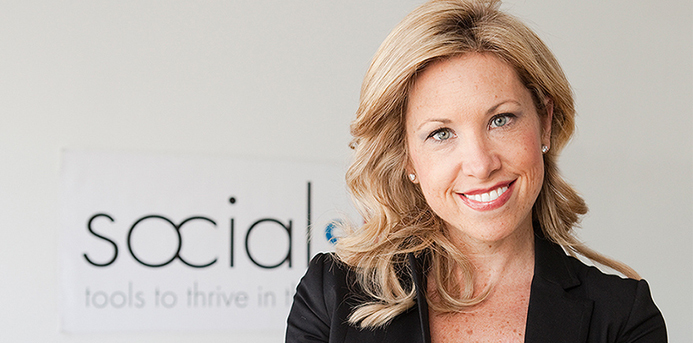The rules of socializing aren’t what they used to be. Faye de Muyshondt is here to help.
The busy mother of one is the founder of Socialsklz 🙂, an interactive program designed to strengthen social and emotional skills. “Our goal is to help students learn the vital tools needed to succeed on the playground, in the classroom and, ultimately, at the workplace,” de Muyshondt says. These skills range from learning how to start a conversation, to using proper table manners and conveying an attitude of gratitude. There is also a chapter on preventing and correcting “unsavory kid language” (like, um, ya know, etc.) and another on teaching kids how to be safe, respectful and responsible online.
De Muyshondt didn’t set out to be the Emily Post of the modern age, but her experience as a PR executive and media trainer helped her realize that everyone could benefit from learning how to make a good first impression. This “ah-ha” moment quickly led to the creation of the Socialsklz 🙂 program, which has been awarded praise and accolades from parents, school administrators and, most importantly, students.
Currently, de Muyshondt is touring the country promoting her new book, “Socialsklz 🙂 for Success.” In anticipation of her book readings January 21-23, I chatted with Faye by phone and asked her to share with us some of her best tips for parents.
Starting a Conversation
Conversation doesn’t come easy for many people, especially kids, which is why de Muyshondt believes it’s important to give kids a set of “tools” they can use with anyone at anytime. These tools include making eye contact, learning several different ways to greet someone, responding to questions with more than one word and keeping two to three questions in their back pocket should they feel the need to come up with something to say.
Helping Shy Children
One of the most common questions parents often ask is how to help shy children in social situations. De Muyshondt recommends letting your children blossom at their own pace by giving them time to observe a situation and getting comfortable before jumping in. It’s also important to empower them by teaching them strategies for starting a conversation and keeping it going (as well as helping them develop a list of questions they can ask anyone at anytime). “Stay away from the ‘she’s just shy’ excuse,” de Muyshondt says, “as it can often become a self-fulfilling prophecy.”
Online Etiquette
As technology and social media become more commonplace, raising responsible digital citizens becomes more important. The problem with technology is that is keeps changing, so it’s up to parents to be proactive and stay informed. De Muyshondt recommends learning about the sites your kids are likely to visit before allowing them to go online. Set clear rules and expectations and try to role-play situations that might be tricky (such as what to do when someone asks you to share your password or give out personal information). You also want to talk to your kids about the consequences of their online actions and have a zero tolerance policy for bullying and disrespectful behavior.

